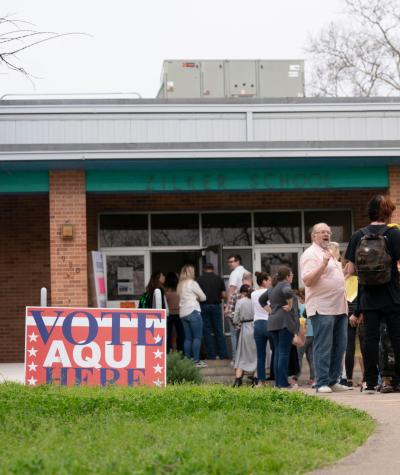By Grace Thomas, a Summer 2021 CLC intern
Like clockwork every even year, the first Tuesday of November is a national election day. Election Day was not randomly chosen though. In 1845, Congress selected the most convenient day to hold a national election day for the greatest number of voters at the time—farmers.
Since Saturdays and Sundays were religious days, Wednesdays were market days, and farmers may have needed Monday to travel to a polling location, the first Tuesday after the fall harvest proved to be the most convenient day for most voters.
But now, over 175 years later, Election Day is no longer accessible for many Americans.
With over 82% of Americans working during the week and 41% of 18–to–24–year–olds in school, participating in national elections can be difficult. Many voters face barriers when trying to find time to vote during the work week, and waiting in line to cast a ballot may take a significant amount of time, when one in five voters must wait more than 30 minutes to vote.
This is especially true for low-income voters and minority voters who cannot get the time off to vote or who are forced to wait in long lines on Election Day. Black and Hispanic voters in one survey indicated that they were twice as likely as white voters to not get time off to vote. Minority voters also reported waiting at least 45% longer in polling place lines than white voters.
State legislatures, businesses and schools can best support workers’ and students’ freedom to vote by instituting state election day holidays and mandating paid time off for employees.
The creation of state election day holidays and mandatory paid time off should be instituted together. Service industries, particularly retail and food industries, are not required to observe federal holidays, meaning front-line workers, who are disproportionately low-income and minority workers, could be excluded from the benefits of government election day holidays.
Mandatory paid time off for employees ensures that citizens have a say in the key decisions that impact our lives through the electoral process, and not just those individuals who work government or white-collar jobs.
Instituting these measures would have a significant impact on working voters. Because voters will have more personal time to vote, voter turnout should increase, since at least 14% of Americans who did not vote in 2016 cited not having enough time as the reason for not voting.
Not only would voters have more time to vote on Election Day, but with paid time off voting policies, voters can cast a ballot without the stress of lost wages.
These measures would also cultivate democratic values by providing Americans a real opportunity to be civically engaged. In addition to having time to cast a ballot, more voters would have time to serve as a much-needed poll worker, a political campaign’s volunteer or even a poll monitor.
More polling locations could also be accessible to voters, as more buildings like schools are freed up to be used as polling locations and supplied with newly available poll workers.
Many states have already made Election Day a state holiday, and in 2020, 28 states already require employers to grant employees time off to vote. However, not all states mandate paid time off, and the amount of time employees have to vote is not uniform.
The variance in time-off laws from state to state creates confusion for working voters–if they even know about their ability to take time off to vote at all. States, businesses and schools need a national standard to ensure equitable voting access for busy voters and eliminate the confusion any voter may have.
Private businesses can have a role to play too. Companies that voluntarily invest even minimal time and effort into get-out-the-vote efforts have a lot to gain by encouraging their employees to vote.
Get-out-the-vote programming has a demonstrated impact on raising brand awareness and strengthening worker relationships. Providing workers paid time off to vote would foster better work environments.
However, states should not just rely on private businesses voluntarily giving time off to vote to their employees. According to one survey, only 45% of large organizations and 55% of small organizations gave their employees paid time off to vote–if they gave their employees time off to vote at all.
More working voters would be protected through state-mandated policies that protect workers’ wages while giving them time to cast a ballot during the workday.
Since its origin, Election Day was intended to be convenient for working Americans. We need Election Day holidays and paid time off policies so that voting is actually convenient and accessible for voters and helps make the promise of democracy more real for us all.
